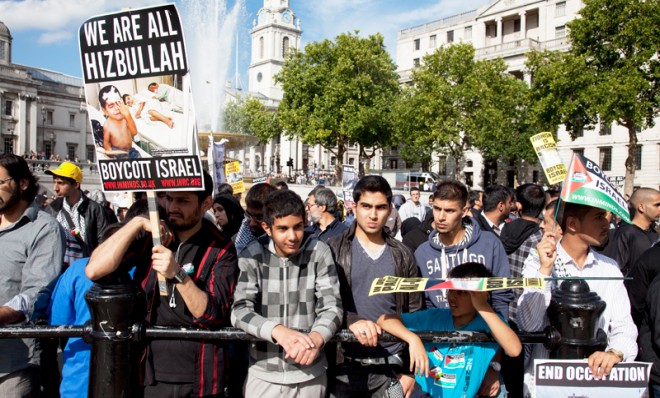What the EU's blacklisting of Hezbollah means for the Middle East
Many say the militant organization should have been sanctioned long ago


A free daily email with the biggest news stories of the day – and the best features from TheWeek.com
You are now subscribed
Your newsletter sign-up was successful
European Union governments added Hezbollah's military wing to their list of terrorist organizations on Monday, an abrupt policy reversal that could result in visa bans and the freezing of assets belonging to individuals and groups linked to Hezbollah, a Lebanese Shiite militant group. The point, EU ministers said, was to send Hezbollah leaders a warning and to make it harder for them to make trouble abroad.
The blacklisting came in response to an escalation of Hezbollah's alleged activities in Europe, including a 2012 attack blamed on the organization that killed five Israelis and a Bulgarian at a Black Sea resort in Bulgaria. A Hezbollah operative was also convicted of planning a similar attack in Cyprus. Support for the sanctions grew recently as Hezbollah began sending fighters to help President Bashar al-Assad's forces battle rebels in neighboring Syria.
Lebanese caretaker Foreign Minister Adnan Mansour said the decision was "hasty" and could destabilize Lebanese politics, but many Middle East experts see the EU's decision as an overdue warning to Hezbollah. Walter Russell Mead says at The American Interest that it has long been clear that Hezbollah's armed wing deserved to be added to terror lists, but the group's support for "Butcher Assad" and the textbook terrorism case in Bulgaria made it pointless to try denying the truth any longer.
The Week
Escape your echo chamber. Get the facts behind the news, plus analysis from multiple perspectives.

Sign up for The Week's Free Newsletters
From our morning news briefing to a weekly Good News Newsletter, get the best of The Week delivered directly to your inbox.
From our morning news briefing to a weekly Good News Newsletter, get the best of The Week delivered directly to your inbox.
Next up: The EU will officially recognize that the sun rises in the East...
All that said, there's no need to wring one's hands or cluck one's tongue too much over this. It's is always a good thing when policy is based on reality instead of pleasing fictions.[The American Interest]
Quietly scolding Hezbollah certainly has not worked, as its recent push in Syria proved. "This could be a game-changer," says Domhnall O'Sullivan at EU Observer, but there's also a chance it could backfire.
A blacklisting could ostracize and re-radicalize Hezbollah — an important and legitimate representative of Lebanon’s sizeable Shia Muslim population — at a time when it already feels cornered by the shifting regional sands. [EU Observer]
The accompanying sanctions could be a nightmare to implement, since untangling people in Hezbollah's secretive military wing from its political and social operations will be difficult. The non-military side of Hezbollah has elected representatives in Lebanon's government, and funds extensive social welfare programs, including hospitals and schools.
The Jerusalem Post says in an editorial that only putting part of Hezbollah on the terrorism list won't be enough to make a difference. "Listing only its 'military wing' is a start, but there is no real difference between the wings," the Israeli newspaper says. "Nevertheless this is a minimum first step in confronting an organization that has for too long terrorized not only the region, but EU member states such as Bulgaria as well."
A free daily email with the biggest news stories of the day – and the best features from TheWeek.com
Harold Maass is a contributing editor at The Week. He has been writing for The Week since the 2001 debut of the U.S. print edition and served as editor of TheWeek.com when it launched in 2008. Harold started his career as a newspaper reporter in South Florida and Haiti. He has previously worked for a variety of news outlets, including The Miami Herald, ABC News and Fox News, and for several years wrote a daily roundup of financial news for The Week and Yahoo Finance.
-
 6 of the world’s most accessible destinations
6 of the world’s most accessible destinationsThe Week Recommends Experience all of Berlin, Singapore and Sydney
-
 How the FCC’s ‘equal time’ rule works
How the FCC’s ‘equal time’ rule worksIn the Spotlight The law is at the heart of the Colbert-CBS conflict
-
 What is the endgame in the DHS shutdown?
What is the endgame in the DHS shutdown?Today’s Big Question Democrats want to rein in ICE’s immigration crackdown
